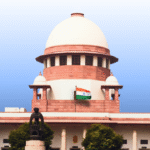CRIMINAL LAW – COMPANIES ACT, 2013 – PREVENTION OF MONEY-LAUNDERING ACT, 2002 (PMLA) – CODE OF CRIMINAL PROCEDURE, 1973 (Cr.P.C.)
Crl.M.C. No. 6570 of 2022; 25.07.2025
A. Badharudeen, J.
1. Prosecution of Dissolved Company – Whether a dissolved company can be prosecuted for offenses committed during its existence, and if so, how?
- The 1st accused company, M/s. Al Zarafa Travels and Manpower Consultations, was a private limited company involved in cheating nursing aspirants and illegally transferring about Rs. 100 Crores via hawala channels. The 3rd accused (petitioner), a director of the company, was alleged to have knowingly assisted in generating, concealing, and transferring proceeds of crime. Offenses alleged include those under IPC, PC Act, Emigration Act, and PMLA.
- The 1st accused company was categorized as a dissolved company by the Registrar of Companies as of July 15, 2021, and the petitioner (3rd accused) sought to be removed as the representative of this dissolved company.
- Petitioner’s contention: A dissolved company is no longer in existence and, therefore, cannot appoint a representative under Section 305 of Cr.P.C., nor can the prosecution compel a director to represent it. Reliance was placed on Krishnaswamy Sridhar v. State by CBI which discussed Section 305(4) of Cr.P.C..
- Respondent’s contention (Enforcement Directorate): Section 248(7) of the Companies Act, 2013, expressly provides that the liability of directors, managers, officers, and members continues and can be enforced “as if the company had not been dissolved”.
2. Effect of Dissolution on Criminal Liability and Role of Companies Act, 2013
- Section 248 of the Companies Act, 2013 (analogous to Section 560(5) of the 1956 Act) mandates that even when a company ceases to exist as a legal entity after being struck off, its liabilities and the liability of its officers for actions taken during its existence remain. This liability continues and can be enforced as if the company had not been dissolved.
- If a company commits an offense, both the company and the individuals responsible for its affairs can be prosecuted, although jail sentences cannot be imposed on the company.
- When a company is dissolved after the commission of a crime, the general procedure to prosecute the company is to restore its status by setting aside the dissolution. Dissolution or striking off does not erase the company’s liability, and in such cases, the company has to be restored to the register.
- Section 252 of the Companies Act, 2013, allows aggrieved parties or regulators (like ROC, SEBI, IT Department) to apply to the National Company Law Tribunal (NCLT) for restoration within three years from the date of dissolution.
- Section 250 of the Companies Act, 2013, explicitly states that even after dissolution under Section 248, a company ceases to operate except for the purpose of realizing amounts due to the company and for payment or discharge of its liabilities or obligations. This provision implies that the company’s liability continues to survive even after dissolution.
3. Application of PMLA and Cr.P.C. in cases of Dissolved Companies
- Section 70 of the PMLA Act provides that if a company commits a contravention, every person in charge of and responsible for the company’s business, as well as the company itself, shall be deemed guilty and liable to be prosecuted and punished.
- Section 70 of the PMLA Act does not distinguish between an existing and a non-existing (dissolved) company.
- Section 71 of the PMLA Act gives its provisions overriding effect notwithstanding anything inconsistent in any other law.
- The Court noted that while Section 305 of Cr.P.C. deals with the procedure for prosecuting a corporation (allowing it to appoint a representative), it primarily applies to companies in existence. The Cr.P.C. (or the new BNSS) is silent on how a dissolved company, corporation, or society should be prosecuted.
- The Court cited Dhanasingh Prabhu v. Chandrasekar and Aneeta Hada v. Godfather Travels & Tours (P) Ltd., which established that the commission of an offense by a company is an express condition precedent to attract the vicarious liability of directors or employees. This principle, though discussed in the context of NI Act, highlights the necessity of prosecuting the company itself.
- The Court drew a distinction between a company (a separate juristic entity) and a partnership firm (where partners are directly liable) in the context of vicarious liability.
- The Court held that it would be unfair to allow a dissolved company to be proceeded against for civil liabilities but not for criminal offenses committed before dissolution.
- Given the lack of specific procedural provisions, the Parliament needs to consider amending the Criminal Procedure Code and special statutes to address the prosecution of dissolved/struck-off companies.
- Until such legislative amendments, a company that committed an offense before its dissolution or striking off cannot be spared from prosecution.
- Procedure for prosecution in absence of specific law:
- The prosecution can get the company restored to existence and then follow the procedure under Section 305 of Cr.P.C. or Section 342 of BNSS.
- If restoration is not possible, the prosecution can name somebody who was in charge of the company in the Final Report to represent the dissolved company and continue the prosecution proceedings.
4. Conclusion and Directions
- The Court held that the prosecution’s action of arraying the 3rd accused (who was the director) as the representative of the 1st accused dissolved company was justified in the interest of justice.
- The petition seeking to set aside the order and remove the petitioner as the company’s representative was dismissed.
- The Registry was directed to forward a copy of the order to the Law Secretary of the Union of India for further steps in tune with the recommendation for legislative amendments.
For Petitioner : Advs. S. Rajeev, V. Vinay, M.S. Aneer, Prerith Philip Joseph & Sarath K.P.
For Respondents : Advs. Jaishankar V. Nair, Rajesh A. (Spl. Government Pleader) & Rekha S. (Sr. Government Pleader)


